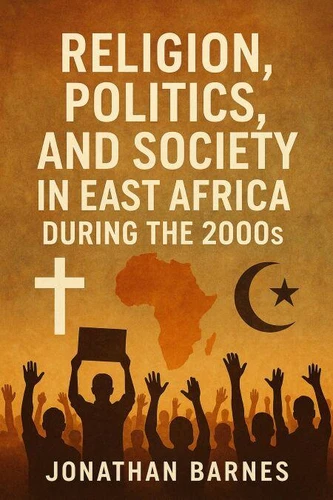Religion, Politics, and Society in East Africa During the 2000s
Par :Formats :
Disponible dans votre compte client Decitre ou Furet du Nord dès validation de votre commande. Le format ePub est :
- Compatible avec une lecture sur My Vivlio (smartphone, tablette, ordinateur)
- Compatible avec une lecture sur liseuses Vivlio
- Pour les liseuses autres que Vivlio, vous devez utiliser le logiciel Adobe Digital Edition. Non compatible avec la lecture sur les liseuses Kindle, Remarkable et Sony
 , qui est-ce ?
, qui est-ce ?Notre partenaire de plateforme de lecture numérique où vous retrouverez l'ensemble de vos ebooks gratuitement
Pour en savoir plus sur nos ebooks, consultez notre aide en ligne ici
- FormatePub
- ISBN8231520008
- EAN9798231520008
- Date de parution31/05/2025
- Protection num.pas de protection
- Infos supplémentairesepub
- ÉditeurWalzone Press
Résumé
Religion, Politics, and Society in East Africa During the 2000s by Jonathan Barnes provides a deep, thought-provoking exploration of the complex and often turbulent relationship between religion, politics, and social change in East Africa during the early 21st century. Set against a backdrop of political transitions, religious upheavals, and evolving societal norms, this book examines how religious forces-Christianity, Islam, and indigenous beliefs-shaped the region's political landscapes, influenced governance, and sparked both unity and division.
Drawing on a wealth of historical context, case studies from countries like Kenya, Uganda, Rwanda, Sudan, and Ethiopia, and detailed analyses of key political events, Barnes uncovers how religion was both a stabilizing force and a source of conflict. From the explosive political violence in Kenya's 2007 elections to the rise of radical Islam in Somalia, and from Rwanda's remarkable post-genocide reconciliation to Ethiopia's struggles with religious pluralism, this book offers unparalleled insights into the pivotal role religion played in shaping East Africa's future.
With expert analysis and compelling storytelling, Religion, Politics, and Society in East Africa During the 2000s is a must-read for anyone interested in understanding the intersection of faith, politics, and society in one of the world's most dynamic and diverse regions. Whether you are a scholar, policymaker, or casual reader, this book will challenge your perspectives on the forces that have shaped modern East Africa-and will continue to influence its trajectory in the years to come.
Drawing on a wealth of historical context, case studies from countries like Kenya, Uganda, Rwanda, Sudan, and Ethiopia, and detailed analyses of key political events, Barnes uncovers how religion was both a stabilizing force and a source of conflict. From the explosive political violence in Kenya's 2007 elections to the rise of radical Islam in Somalia, and from Rwanda's remarkable post-genocide reconciliation to Ethiopia's struggles with religious pluralism, this book offers unparalleled insights into the pivotal role religion played in shaping East Africa's future.
With expert analysis and compelling storytelling, Religion, Politics, and Society in East Africa During the 2000s is a must-read for anyone interested in understanding the intersection of faith, politics, and society in one of the world's most dynamic and diverse regions. Whether you are a scholar, policymaker, or casual reader, this book will challenge your perspectives on the forces that have shaped modern East Africa-and will continue to influence its trajectory in the years to come.
Religion, Politics, and Society in East Africa During the 2000s by Jonathan Barnes provides a deep, thought-provoking exploration of the complex and often turbulent relationship between religion, politics, and social change in East Africa during the early 21st century. Set against a backdrop of political transitions, religious upheavals, and evolving societal norms, this book examines how religious forces-Christianity, Islam, and indigenous beliefs-shaped the region's political landscapes, influenced governance, and sparked both unity and division.
Drawing on a wealth of historical context, case studies from countries like Kenya, Uganda, Rwanda, Sudan, and Ethiopia, and detailed analyses of key political events, Barnes uncovers how religion was both a stabilizing force and a source of conflict. From the explosive political violence in Kenya's 2007 elections to the rise of radical Islam in Somalia, and from Rwanda's remarkable post-genocide reconciliation to Ethiopia's struggles with religious pluralism, this book offers unparalleled insights into the pivotal role religion played in shaping East Africa's future.
With expert analysis and compelling storytelling, Religion, Politics, and Society in East Africa During the 2000s is a must-read for anyone interested in understanding the intersection of faith, politics, and society in one of the world's most dynamic and diverse regions. Whether you are a scholar, policymaker, or casual reader, this book will challenge your perspectives on the forces that have shaped modern East Africa-and will continue to influence its trajectory in the years to come.
Drawing on a wealth of historical context, case studies from countries like Kenya, Uganda, Rwanda, Sudan, and Ethiopia, and detailed analyses of key political events, Barnes uncovers how religion was both a stabilizing force and a source of conflict. From the explosive political violence in Kenya's 2007 elections to the rise of radical Islam in Somalia, and from Rwanda's remarkable post-genocide reconciliation to Ethiopia's struggles with religious pluralism, this book offers unparalleled insights into the pivotal role religion played in shaping East Africa's future.
With expert analysis and compelling storytelling, Religion, Politics, and Society in East Africa During the 2000s is a must-read for anyone interested in understanding the intersection of faith, politics, and society in one of the world's most dynamic and diverse regions. Whether you are a scholar, policymaker, or casual reader, this book will challenge your perspectives on the forces that have shaped modern East Africa-and will continue to influence its trajectory in the years to come.

















